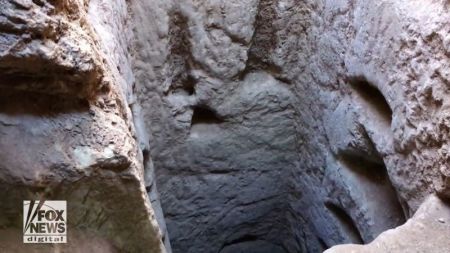Ancient Secret Church Discovered Under ISIS-Occupied City in War Ravaged Syria

An ancient church that's believed to have operated in secret has been discovered in Manbij, Syria, along with artifacts from the first centuries of Christianity's existence and human remains.
For more than two years Manbij was occupied by the Islamic State terror group before it was liberated in 2016.
Abdulwahab Sheko, head of the Exploration Committee at the Ruins Council in Manbij, said in a Fox News report on Tuesday that the discoveries include the ruins of what appears to have been an ancient Christian church, including various crosses carved into the surviving columns and walls.
The church had been structured in such a way to allow people to flee through passages should they have been discovered.
The ruins include narrow tunnels, grooved shelves for light, a myriad of escape routes, hidden doors, and three jagged steps leading to what was once an altar.
Archaeologists believe the Christians were likely hiding from the Roman Empire, which had outlawed the religion in the early stages of its existence.
John Wineland, professor of history and archaeology at Southeastern University, suggested that the secret church could date back to the third or fourth century.
"They indicate that there was a significant Christian population in the area which felt they needed to hide their activities," Wineland said. "This is probably an indication of the persecution by the Roman government, which was common in the period."
The professor added that before the faith was decriminalized by Emperor Constantine in 313 A.D., Christians had to meet "in secret, underground, to avoid trouble. But the Romans were fearful of any group that met in secret."
Sheko revealed that human remains have also been found at the site, but the researchers need more assistance to test the bones. He said that the international response has been slow, however, given the ongoing civil war that is devastating the country.
The head of the Exploration Committee noted that it was fortunate that IS, which is infamous for destroying Christian churches and ancient historical sites, did not find the ruins of the secret church during their two-year occupation.
The area has led to the discovery of later Christian sites as well, where the practice of the faith appears to have been more open and accepted.
Sheko declared that Muslims and Christians can work together to unearth and protect the important finds.
"We are Muslim, but we are not like ISIS Muslims," he said. "We take care of these Christian ruins. We respect them. We respect humanity."
IS' attacks on cities throughout Iraq and Syria have led to other major archaeological discoveries. The militants destroyed the biblical Tomb of Jonah in 2014 in eastern Mosul, which later gave researchers insight into ancient tunnels and 2,700-year-old inscriptions beneath the site.
The Neo-Assyrian inscriptions established links to figures mentioned in the Bible, such as King Sennacherib, whose military rule is described in II Chronicles 32:1 in the Old Testament.





















